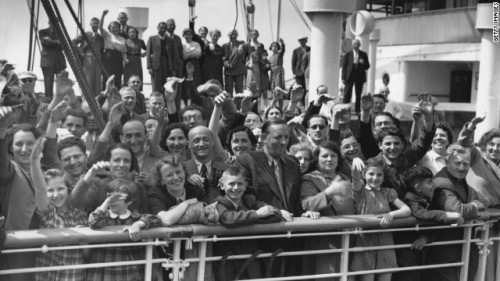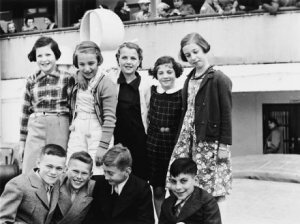Poets express their impressions of the world through voice, the sound of the poem spoken inside the readers’ imaginations and on their tongues.The individual voice is distinctive, authoritative, convincing. One cannot mistake poems by Seamus Heaney for Elizabeth Bishop’s, Robert Frost’s for Robert Lowell’s, Wallace Steven’s for Wilfred Owen’s. Their pitch and register, rhythms and intonations, catches and breaks, their melodies — all these bear the mark of the individual poet. Mark Doty tells us that “Poetry’s work is to make people real to us through the agency of the voice,” and doing so “by inscribing [an] individual presence” on our consciousness through “words and sounds [that] mark where one human being stood, bound in time, reporting on what it is to be one.”
In “Crusoe in England” Elizabeth Bishop creates Robinson Crusoe remembering his years of loneliness on a Pacific island, his precise, repetitious descriptions reflecting the shuddering of an isolated mind:
“the overlapping rollers —
a glittering hexagon of rollers
closing and closing in, but never quite,
glittering and glittering, though the sky
was mostly overcast.”
And how, once, so tired of the monotonous white colors of the island he
“dyed a baby goat bright red
with my red berries, just to see
something a little different.”
 Jewish refugees aboard the SS St. Louis
Jewish refugees aboard the SS St. Louis
Poetry gives intimate voice to cast-aways both in the leap of an observer and through the eyes of one who must survive the outcast life. In “Refugee Blues” W.H. Auden puts on the voice of a Twentieth Century version of ‘the Other”, the alien threat of the time:
“Came to a public meeting; the speaker got up and said:
‘If we let them in, they will steal our daily bread’;
He was talking of you and me, my dear, he was talking of you and me.
Thought I heard the thunder rumbling in the sky;
It was Hitler over Europe, saying: ‘They must die’;
We were in his mind, my dear, we were in his mind.
Saw a poodle in a jacket fastened with a pin,
Saw a door opened and a cat let in:
But they weren’t German Jews, my dear, but they weren’t German Jews.” 
Jewish children of the SS St. Louis
Syrian refugees somewhere in the Balkans
In our time, in her own voice, another who yearned for safety. From “Conversations about home (at a deportation centre)” by Warsan Shire:
“They ask me how did you get here? Can’t you see it on my body? The Libyan desert red with immigrant bodies, the Gulf of Aden bloated, the city of Rome with no jacket. I hope the journey meant more than miles because all of my children are in the water. I thought the sea was safer than the land. I want to make love but my hair smells of war and running and running. I want to lay down, but these countries are like uncles who touch you when you’re young and asleep. Look at all these borders, foaming at the mouth with bodies broken and desperate. I’m the colour of hot sun on my face, my mother’s remains were never buried. I spent days and nights in the stomach of the truck, I did not come out the same. Sometimes it feels like someone else is wearing my body.” 
Syrian families on the road
Poetry asserts the individual humanity of the speaker. It leads us into a place where we can listen. It transforms the abstract human being, the statistic, the masses panicked at the border crossing, into a person we know because we carry some part of him or her within ourselves. That moment, the blow delivered, demands that we see the souls of the ones we might be willing to ignore. Good poems take us inescapably into the realm of another person’s “I”.
When its subject is grand, a poem gives life to the big voice that declaims, and yet because its language is so strictly bounded by the privacy of our reading, it comes to our ears surrounded by silence and paradoxically, all the more powerful. In Tennyson’s “Ulysses” the hero speaks from old age, once more readying himself to leave Ithaca. His is a resounding voice; this is the delivery of a King. Ulysses tries to capture in one long lyric what it means to never give up the quest, the center of his life and he believes, all lives.
“It may be we shall touch the Happy Isles,
And see the great Achilles, whom we knew.
Tho’ much is taken, much abides; and tho’
We are not now that strength which in old days
Moved earth and heaven, that which we are, we are;
One equal temper of heroic hearts,
Made weak by time and fate, but strong in will
To strive, to seek, to find, and not to yield.”
This poem also gives us this observation in a voice more withdrawn, more contemplative:
“The lights begin to twinkle from the rocks:
The long day wanes: the slow moon climbs: the deep
moans round with many voices.”
In this one moment, the sea and light and time in motion rise to him in the word “moan”, both a description of the sound of the waters and a fathomless memory of the dead who met their end there, some of whom he lost on his journey home from Troy. Now he speaks within a pensive space, his proud oration put aside, his voice turning inward.
A poem may cry out, whisper, beseech, explain, beguile, warn or take on any of a myriad of tones, but every speaker wants to reach some quality inside us, the listener and reader, and change our perceptions. Poems show us worlds we did not know until our eyes fell on the page and the solitary voice began to speak to you and I, solitary and attentive.
